Professor Dr. Mosleh Uddin Ahmed, Former Principal, Comilla Medical College
Rivers in Existential Crisis: Who Will Save Them?
On September 27, 2020, during an online seminar held in observance of World Rivers Day, the Chairman of the National River Protection Commission, Mujibur Rahman Howlader, stated that, with the support of local administrations, over 770 rivers have been identified across Bangladesh. According to a river expert, the number stands at 1,178, though data collection is still ongoing. During the seminar, the Chairman and other members of the Commission emphasized the importance of enforcing laws to protect rivers.
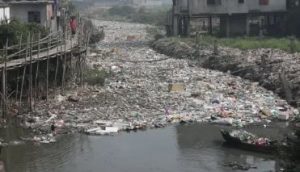
Their discussion highlighted that both the Constitution of Bangladesh and the Supreme Court have granted legal authority to government officials for the protection of rivers. The commission repeatedly asserted that without bold enforcement by Divisional Commissioners and Deputy Commissioners, saving rivers would not be possible.
Government officials raised concerns about encroachments on riverbanks, such as solar power projects on land belonging to the Brahmaputra and Teesta rivers. During discussions on rivers in Jamalpur and Narayanganj, the names of some top business entities in the country came up. Referring to a southern district, the Chairman pointed out that obstacles to river flow are being created under the guise of building docks. He questioned: How can the very institutions tasked with protecting rivers be involved in occupying them?
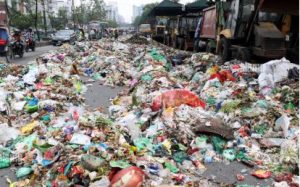
He also cited a Supreme Court verdict declaring that rivers are public property—not even owned by the state—and the responsibility of their protection lies with the state and its affiliated bodies.
The seminar stressed the need for courageous enforcement of existing laws by government officials. In the final session, Commission Member Sharmin Murshid stated, “What needs to be done to save and recover rivers is clearly outlined in law. It is the administration’s duty to enforce it.” A university professor added that nearly 50,000 people have illegally occupied river land—a criminal offense—and should be handed over to the police instead of merely being served eviction notices.
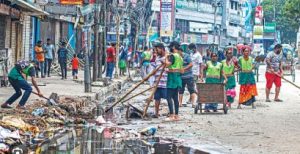
The crisis is not limited to Dhaka; it’s a nationwide issue. A clear target must be set to make all rivers pollution-free, and all organizations and businesses must be directed to immediately cease pollution in rivers and wetlands. Public and private entities involved in polluting activities must be strictly ordered to stop. The River Protection Commission needs more manpower for proper oversight. Some rivers like the Buriganga, Balu, and Turag have already had their boundaries demarcated, and the same must be done for all rivers.
As the guardian organization for rivers and wetlands in Bangladesh, the National River Protection Commission remains alert about issues like encroachment, pollution, and navigability loss. Rivers are increasingly affected by population pressure, unplanned development, upstream water withdrawal by neighboring countries, and climate change. The Commission regularly communicates its findings and recommendations to relevant ministries, who, if they act on them, can save the nation from irreversible damage. Otherwise, these rivers will soon become ecologically dead, and Bangladesh will lose its identity as a riverine country.
The Forest Crisis in Bangladesh
A recent report reveals that 2,57,158 acres of forest land across Bangladesh have been illegally occupied. 1,60,566 individuals and organizations are responsible for these encroachments, constructing residences, farms, and factories on the land.
According to the Forest Department, 88,215 individuals have illegally seized 1,38,613 acres of reserved forest land. Of these, 172 people have set up factories and industrial complexes on 820 acres of forest. An additional 3,329 individuals have built markets, educational institutions, cottages, farms, and resorts on 4,914 acres. Meanwhile, 58,407 individuals have built homes, and 26,307 others are using the land for agriculture and gardening without any permanent structures.
Despite the Environment Protection Act prohibiting alteration of landforms—including cutting hills and hillocks for public or private use—such practices continue in various regions, destroying forests and landscapes.
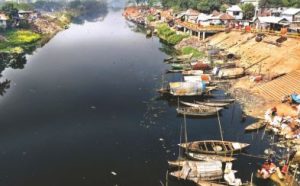
Global Warming and Environmental Implications
Due to rising global temperatures, polar ice is melting, putting low-lying coastal areas at increasing risk of saltwater intrusion. This is gradually salinizing the soil and water in coastal regions. As the permafrost thaws, new microorganisms are being released into the environment, raising concerns about future pandemics, similar to COVID-19.
To tackle global warming and climate change, there is no alternative to forest expansion, conservation, and restoration. Forests provide clean air, nutritious food, potable water, and recreational spaces. In developed countries, 25% of pharmaceutical ingredients are derived from plants; in developing countries, the number exceeds 80%.
Thus, protecting forest ecosystems is critical to human survival. However, development and commercial activities are expanding even within protected areas, due to legal loopholes and weak enforcement. The Forest Act must be modernized and strictly implemented to conserve and restore forests. Otherwise, the destruction of forests, along with invasive plant species and commercial exploitation, will continue to devastate natural forests, leading to the collapse of ecosystems and biodiversity.
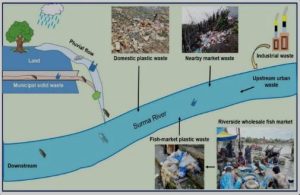
Waste Management and Public Awareness
People are increasingly asking: How is waste generated, how is it collected, transported, and disposed of? They want to know how to stop the formation of hazardous substances and how to reuse or recycle waste.
Despite having various policies, implementation is lacking. Uncontrolled dumping of garbage creates foul odors and spreads infectious diseases, posing a major public health risk and disturbing the environmental balance.
It is vital to develop and implement a comprehensive waste management policy across both rural towns and major cities.
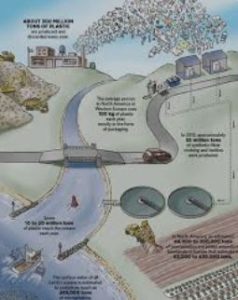
The Gomti River Crisis in Comilla
The Gomti River and its old channel are now facing an existential crisis. A group of self-interested individuals are illegally extracting soil from the riverbanks and engaging in unlawful business, damaging the river’s aesthetic beauty. Unauthorized structures are being built along the banks, and pollution is rampant.
Even the old Gomti, from Tikkarchar to Kaptan Bazar, is under threat. Illegal settlements are gradually reclaiming river space, discharging sewage and solid waste directly into the river, polluting both the water and surrounding environment.
The Bangladesh Poribesh Andolon (BAPA) has submitted memorandums and demands to the District Administration and City Corporation, calling for river protection, clean-up, and the removal of illegal encroachments. Though occasional drives are conducted by magistrates, there is no consistent oversight to ensure the river’s long-term safety.

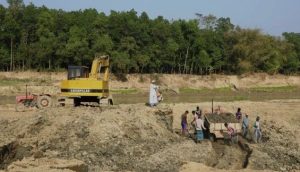
Rivers such as Dakatiya (Laksam), Salda (Burichang-Brahmanpara), Kathalia (Homna-Titas), and Buri River (Muradnagar) are also being neglected. BAPA has demanded that Old Gomti be transformed into a beautiful, clean infrastructure like Hatirjheel, a demand supported by local NGOs and conscious citizens.
In alignment with this broad vision, the public and environmentalists have unanimously agreed on the need for bold, collective action to mark World Environment Day 2025.

